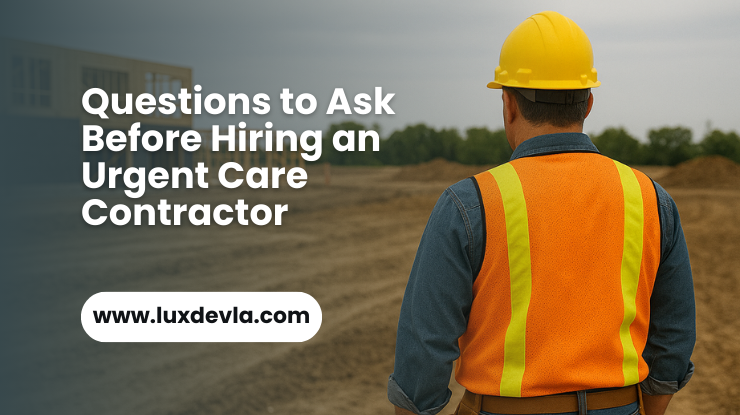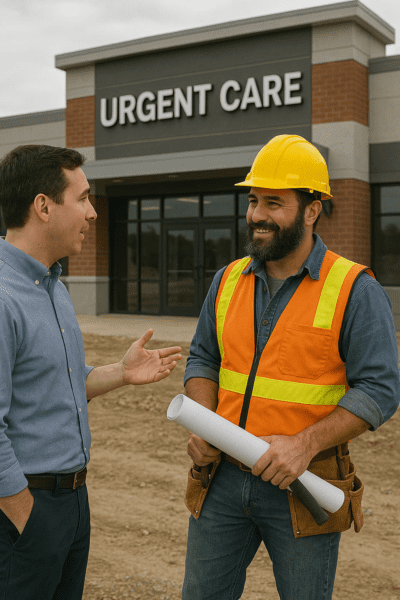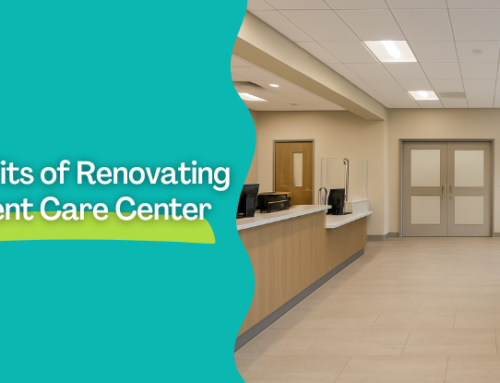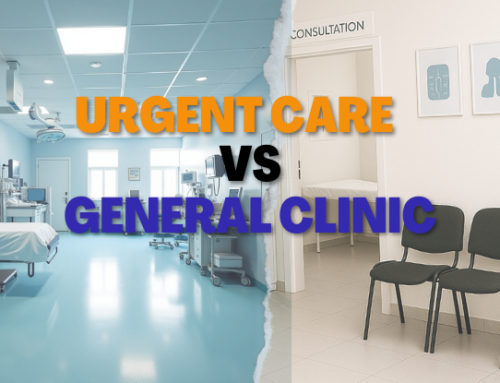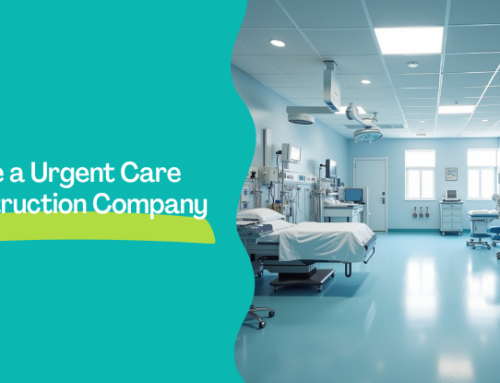Are all construction companies equipped to build a fully compliant, patient-ready urgent care center?
The short answer is No, and choosing the wrong one could cost you time, money, and even your operating license.
Urgent care facility construction demands more than just walls and wiring—it requires intimate knowledge of healthcare regulations, infection control standards, and clinical workflow optimization.
From installing negative pressure rooms to ensuring ADA compliance and medical-grade HVAC systems, these projects bridge construction with clinical precision.
That’s why vetting the right urgent care contractor is not just smart—it’s essential.
You’re not building an office; you’re building a medical environment where patient care, safety, and legal compliance converge.
Whether you’re a healthcare entrepreneur, a private equity group, or a multi-location practice expanding its footprint, this guide outlines the exact questions you need to ask to ensure your build-out is in expert hands.
At Lux Development Group, we specialize in urgent care facility build-outs tailored to meet California healthcare construction codes, maximize patient flow efficiency, and reduce downtime through tightly managed timelines.
When it comes to choosing an urgent care contractor, we bring healthcare-specific experience, precision, and peace of mind.
So what exactly sets urgent care construction apart from other commercial or medical build-outs?
Understanding these unique requirements is the first step to asking the right questions and avoiding costly missteps.
Let’s explore the specialized elements that make urgent care construction a distinct discipline within healthcare facility development.
Contents
- The Unique Demands of Urgent Care Construction
- Important Questions to Ask Before Hiring an Urgent Care Contractor
- Experience & Specialization in Healthcare Construction
- 1. How many urgent care or medical facilities have you completed?
- 2. Can you provide case studies or healthcare-specific client references?
- 3. What is your design approach for clinical operations and patient flow?
- 4. Are you familiar with ADA, HIPAA, and infection control requirements in medical construction?
- Project Management & Communication
- 5. What is your project management process from design to completion?
- 6. Who will be our primary point of contact, and what is their experience?
- 7. How do you handle communication, progress updates, and resolving issues?
- 8. How do you manage timelines and prevent project delays?
- 9. What technology or software do you use for scheduling and collaboration?
- Budget Transparency & Contract Clarity
- 10. How do you develop your cost estimates?
- 11. What type of contract do you use—fixed-price, cost-plus, or another model?
- 12. How do you handle change orders or unexpected costs?
- 13. What are your payment terms and billing schedule?
- Team, Licensing & Insurance
- 14. Who will be on the construction team, and how are subcontractors vetted?
- 15. Are you fully licensed, bonded, and insured for healthcare construction in our state or city?
- Quality, Safety & Post-Construction Support
- 16. What quality control measures do you have during construction?
- 17. What is your safety record, and how do you ensure job site safety?
- 18. What warranties do you offer on workmanship and materials?
- 19. What kind of support do you offer after construction is complete?
- Construction Red Flags to Avoid
- Choosing an Urgent Care Contractor: A Checklist for Healthcare Construction
- Conclusion
- Ready to Build Urgent Care Facilities with Confidence?
The Unique Demands of Urgent Care Construction
Building an urgent care facility is not the same as renovating an office or even a general medical suite. These specialized healthcare environments must support fast-paced, high-volume clinical operations while maintaining strict compliance with federal, state, and local health codes.
Unlike typical commercial projects, urgent care construction requires a deep understanding of how patients, staff, and medical equipment move through a space.
Clinical flow must be optimized from the front desk to the exam room, and from the lab to diagnostic imaging.
This includes:
- Designing infection control protocols,
- Strategically placing handwashing stations, and
- Planning for negative pressure isolation rooms
All of which must be considered in the earliest planning stages.
Construction teams must also integrate specialized systems like medical gas lines, lead-shielded X-ray rooms, and redundant HVAC for climate and air quality control.
These installations must meet current OSHA, ADA, and HIPAA standards and be scalable for future technologies like telemedicine integration and digital health infrastructure.
To meet these needs, the ideal builder isn’t just a contractor; they’re a partner with proven experience in healthcare facility development. Choosing one without this background can result in compliance issues, costly redesigns, or delayed licensure approval.
Now that you understand what makes urgent care facility construction uniquely demanding, it’s time to focus on what to ask during the vetting process.
Did you know that total construction spending on healthcare in the U.S. reached $69.3 billion in December 2024?
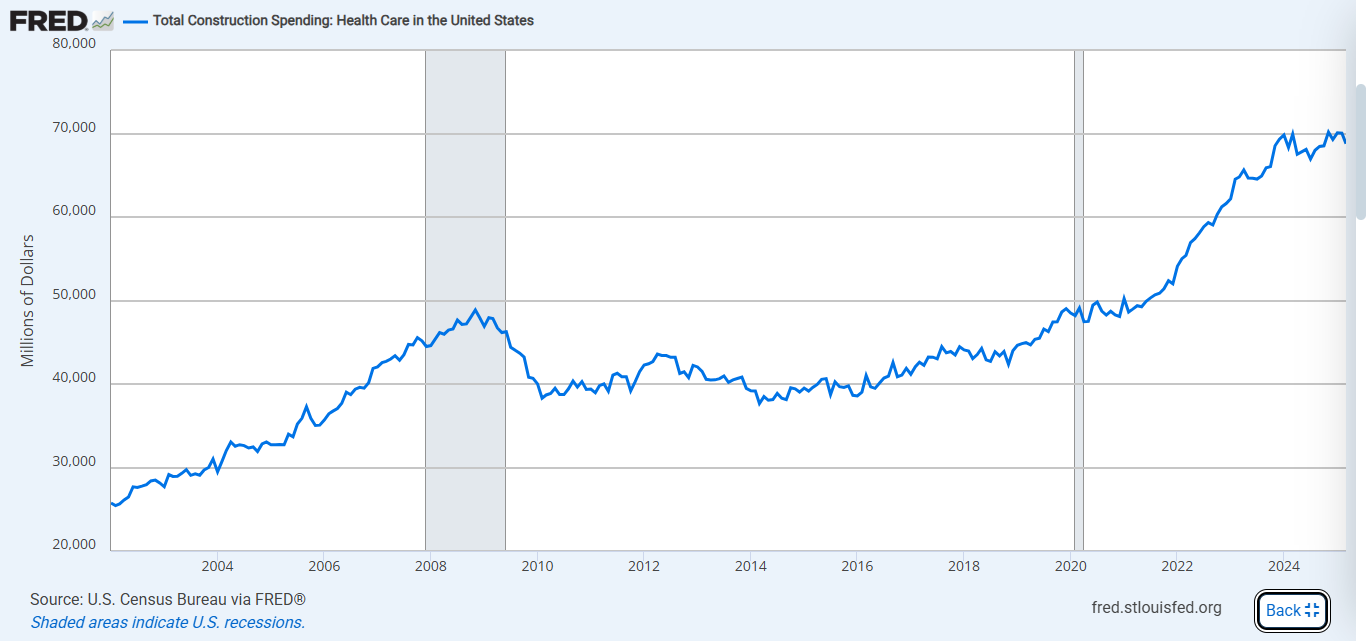
Source: U.S. Census Bureau via FRED®
Important Questions to Ask Before Hiring an Urgent Care Contractor
Before hiring an urgent care contractor, it’s crucial to ask the right questions that reveal their expertise, reliability, and ability to meet healthcare-specific standards. From understanding their experience with similar medical builds to evaluating their communication practices and problem-solving approach, the answers you receive can help prevent costly delays and ensure compliance. Verifying licenses, insurance, and client references also plays a key role in selecting a contractor who can deliver a safe, timely, and high-quality urgent care facility.
Experience & Specialization in Healthcare Construction
These FAQs uncover real expertise and filter out general contractors lacking clinical experience.
1. How many urgent care or medical facilities have you completed?
A qualified urgent care contractor should have a clear track record of completing multiple healthcare facilities.
Look for firms that can name specific urgent care centers, outpatient clinics, or ambulatory surgical centers they’ve built.
Ask about project sizes, timelines, and how they handled medical compliance. This gives you insight into their capability and consistency across healthcare-specific builds.
2. Can you provide case studies or healthcare-specific client references?
Any reputable healthcare builder should have case studies or client references ready to share.
These should include project photos, scope of work, and details like square footage, facility type, and services supported (like radiology or labs).
You can also ask to speak with past clients to confirm whether the contractor delivered on time, within budget, and in compliance with medical standards.
3. What is your design approach for clinical operations and patient flow?
Contractors experienced in urgent care construction will talk about optimizing layout for fast, efficient movement of patients and staff.
They may mention exam room sequencing, dual-access rooms, or how they design around high-traffic zones like reception and triage. This helps ensure smoother operations once your facility opens and supports better patient outcomes.
4. Are you familiar with ADA, HIPAA, and infection control requirements in medical construction?
Yes, and any contractor you hire should be too. These standards affect everything from doorway widths to air filtration.
Ask them how they build to meet ADA accessibility guidelines, ensure HIPAA-compliant privacy measures, and support infection control using proper materials and HVAC design. Their answer should include real-world examples, not just code references.
This section helps ensure that your contractor has hands-on experience with healthcare compliance—not just general construction knowledge.
Project Management & Communication
Once a contractor’s healthcare experience is verified, the next critical step is understanding how they plan, coordinate, and communicate throughout the project. These questions reveal whether their processes are proactive, transparent, and structured to support medical facility requirements.
5. What is your project management process from design to completion?
A qualified urgent care contractor should outline a clear, step-by-step process that covers planning, permitting, design, construction, inspections, and final handover.
Ask if they use a design-build model or work with third-party architects. Their answer should include how they track milestones, manage subcontractors, and coordinate with regulatory authorities.
6. Who will be our primary point of contact, and what is their experience?
You should be assigned a dedicated project manager with direct experience in healthcare construction. This person will be your go-to contact for updates, decisions, and problem-solving.
Ask about their background, past medical projects, and how often you’ll receive updates from them during construction.
7. How do you handle communication, progress updates, and resolving issues?
Look for a builder who provides consistent communication through weekly check-ins, digital dashboards, or cloud-based project management tools.
Their approach should include tracking progress, documenting changes, and outlining how they handle unexpected issues like material shortages or weather delays.
8. How do you manage timelines and prevent project delays?
Top-tier contractors use proactive scheduling, contingency buffers, and critical path tracking to keep projects on time.
Ask if they use tools like Gantt charts or project tracking software and how they mitigate risks that could push back your opening date.
9. What technology or software do you use for scheduling and collaboration?
Reputable firms often use platforms like Procore, Buildertrend, or Microsoft Project to manage schedules and team communications. These tools ensure transparency and help you stay involved in each phase of construction.
This section ensures your contractor can manage a high-stakes healthcare build with the coordination and clarity it demands.
Budget Transparency & Contract Clarity
Understanding how a contractor handles estimates, billing, and changes is also essential. These financial questions help you avoid hidden costs and ensure full alignment with your budget expectations.
10. How do you develop your cost estimates?
A reliable urgent care contractor will offer detailed, line-item estimates—not vague lump sums.
Their estimate should include labor, materials, permits, inspections, medical infrastructure costs, and contingencies.
Ask if their pricing reflects current market rates and includes allowances for healthcare-grade materials.
11. What type of contract do you use—fixed-price, cost-plus, or another model?
Most contractors offer fixed-price or cost-plus contracts.
Fixed-price means one total cost with a defined scope, while cost-plus adds a percentage on top of actual costs.
Ask which contract type they use and request a clear explanation of what is and isn’t included, such as utility hook-ups or specialized equipment installs.
12. How do you handle change orders or unexpected costs?
Change orders happen when there’s a modification to the original scope. A trustworthy contractor will explain their process for documenting, pricing, and approving these changes in writing. Make sure they alert you before changes happen, not after.
13. What are your payment terms and billing schedule?
Ask when payments are due—upfront, upon milestone completions, or monthly – and whether retainers or deposits are required. Most healthcare construction projects follow a milestone-based billing schedule, tied to inspections, approvals, or construction phases.
These questions help ensure you’re financially prepared and protected throughout the entire construction process.
Team, Licensing & Insurance
Beyond experience and cost, you need to know who’s actually doing the work and whether they’re properly qualified and protected.
These questions clarify who’s on the job site and whether they meet regulatory and liability standards.
14. Who will be on the construction team, and how are subcontractors vetted?
Ask for a breakdown of the core team and the subcontractors they regularly use on medical projects.
A strong urgent care contractor will work with licensed, pre-vetted trades like electricians, plumbers, and HVAC specialists who understand healthcare-specific codes. Their answer should show stability in their subcontractor relationships and a clear vetting process.
15. Are you fully licensed, bonded, and insured for healthcare construction in our state or city?
The contractor must hold current licenses for commercial or healthcare construction in your jurisdiction.
They should also carry general liability, workers’ compensation, and, ideally, builder’s risk insurance. Request official documentation. This protects your project legally and financially if issues arise on-site.
These questions verify that the people behind your project are not only skilled but also properly authorized and insured to work in a sensitive healthcare setting.
Quality, Safety & Post-Construction Support
This final group of questions ensures that your urgent care facility will be built to last, meet inspection standards, and come with ongoing support after construction wraps.
16. What quality control measures do you have during construction?
Top-tier urgent care builders implement formal quality control processes, including regular site inspections, detailed punch lists, and third-party reviews.
Ask how often inspections occur and who is responsible for signing off at each phase. Look for a commitment to consistent documentation and accountability.
17. What is your safety record, and how do you ensure job site safety?
Request the contractor’s OSHA report or safety stats for the past three years. A strong safety record reflects a culture of responsibility. Ask if they have a full-time safety officer, hold regular toolbox talks, and provide PPE and compliance training for all workers.
18. What warranties do you offer on workmanship and materials?
Look for clear warranty terms in writing. Most contractors provide a one-year warranty on workmanship and longer warranties for manufacturer-supplied materials. Ask how warranty issues are handled, what’s covered, and whether response times are guaranteed.
19. What kind of support do you offer after construction is complete?
Support should include walkthroughs, punch list resolution, and help with final inspections and certifications. Some builders also provide a transition manual, facilities training, or scheduled check-ins post-occupancy. Make sure post-construction support is part of your agreement.
These questions help you gauge whether the builder stands behind their work and prioritizes safety, longevity, and service after the handover.
By now, you know how to evaluate a contractor based on experience, management, finances, team integrity, and quality control. But just as important is knowing what warning signs to avoid. In the next section, we’ll break down the red flags that signal a contractor might not be the right fit.
Construction Red Flags to Avoid
Even if a contractor sounds qualified on paper, there are subtle warning signs that can signal future problems. These red flags can help you spot risks before hiring an urgent care contractor.
1. Vague answers or lack of healthcare-specific details
If a builder struggles to explain how they address urgent care workflows or doesn’t reference healthcare codes like ADA and HIPAA, that’s a red flag. Healthcare construction requires precision, not guesswork.
2. No portfolio or limited project references
A credible urgent care contractor should have a detailed project portfolio and client testimonials. Avoid firms that can’t provide verifiable examples of past healthcare builds.
3. Extremely low bids compared to competitors
While saving money is important, a significantly lower estimate often means the contractor is cutting corners or leaving out key components that will appear later as change orders.
4. Poor communication during early discussions
If a contractor is slow to respond, vague in emails, or inconsistent in documentation during the proposal stage, that’s a preview of how they’ll behave during construction.
5. High-pressure sales tactics or limited-time offers
Urgent care construction is too important for rushed decisions. Beware of contractors who push for fast commitments, demand large deposits, or won’t give you time to compare options.
These warning signs can help avoid costly mistakes, project delays, and compliance failures.
Now that you know what to watch out for, let’s bring it together with a checklist you can use in meetings or vendor comparisons. This summary will help you confidently vet any construction partner for your urgent care project.
Choosing an Urgent Care Contractor: A Checklist for Healthcare Construction
Use this checklist during interviews or RFP reviews to ensure your builder is equipped for urgent care construction. Each item is grounded in healthcare-specific compliance, project delivery standards, and post-construction reliability.
#1 Proven Track Record in Healthcare Projects: Has the contractor completed multiple urgent care, clinic, or outpatient facility builds? Ask for specific locations, square footage, and references.
#2 Expertise in Medical Codes and Regulations: Are they knowledgeable about ADA accessibility, HIPAA privacy design, OSHA standards, and infection control protocols? Ensure these are integrated from the planning stage.
#3 Transparent, Itemized Cost Estimates: Do they provide a clear breakdown of labor, materials, permits, and contingencies? Confirm their contract type and billing schedule match your expectations.
#4 Dedicated Project Manager with Healthcare Experience: Will you have a single, qualified point of contact? Ask about their credentials and communication structure throughout the project.
#5 Licensed, Bonded, and Fully Insured in Your State: Request proof of licensing and active insurance coverage, including general liability and workers’ compensation.
#6 Defined Quality Control and Safety Protocols: Do they have structured quality inspections and a strong safety track record? Ask about their OSHA compliance procedures and past incident rates.
#7 Post-Construction Support and Warranty Terms: Will they assist with final inspections, offer warranty support, and remain available after handover? Review this in writing.
This checklist turns a complex construction decision into a structured, confidence-building process.
Conclusion
Choosing the right urgent care contractor isn’t just about checking boxes – it’s about safeguarding your investment, ensuring compliance, and delivering a space that functions flawlessly from day one. The right partner will understand the medical nuances, manage the process transparently, and stay accountable through every phase of your build.
Ready to Build Urgent Care Facilities with Confidence?
At Lux Development Group, we don’t just construct urgent care facilities – we engineer compliant, patient-centered environments that support long-term success. If you’re planning to build or renovate an urgent care center in California, let’s talk.

